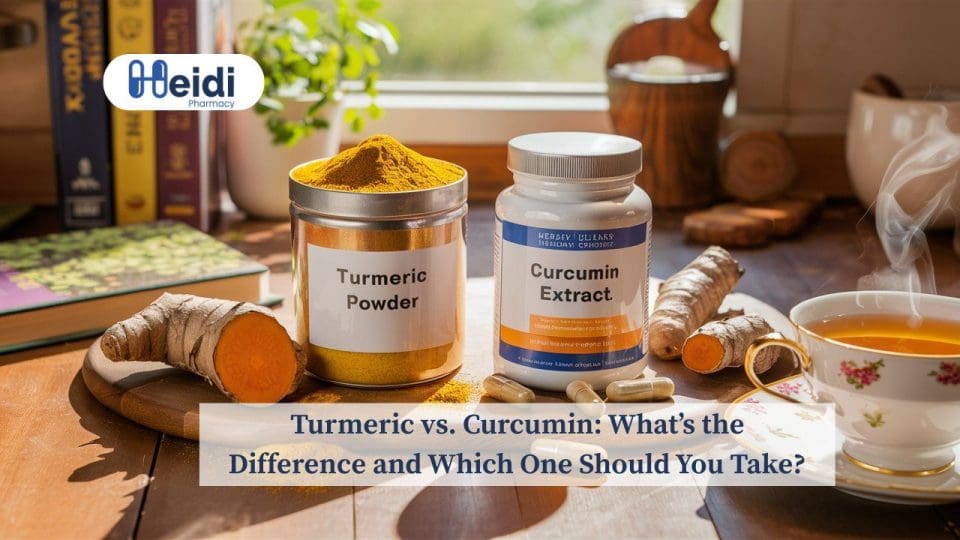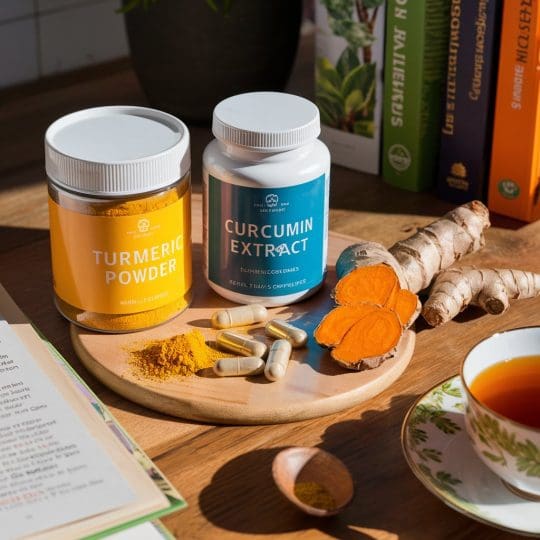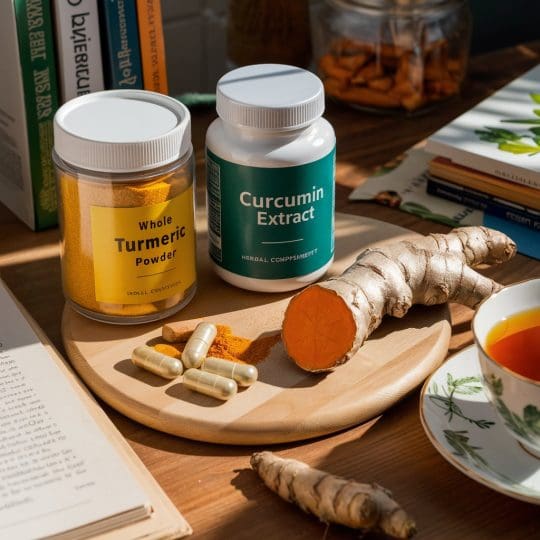
In the world of natural health supplements, Turmeric vs Curcumin has become a hot topic. Both are hailed for their potential to reduce inflammation, support joint health, and boost overall well-being. But are turmeric and curcumin the same thing? Should you be taking turmeric capsules or a curcumin supplement? In this guide from Heidi Pharmacy, we’ll explain the key differences between turmeric and curcumin, explore their unique benefits, and help you decide which is right for your health needs.
What is Turmeric?
Turmeric is a golden-yellow spice derived from the root of the Curcuma longa plant. Used for centuries in Indian Ayurvedic and Chinese medicine, it’s best known for its vibrant color and role in curry dishes. But beyond the kitchen, turmeric benefits are widely appreciated for their anti-inflammatory, antioxidant, and antimicrobial properties.
Key Components of Turmeric vs Curcumin
Turmeric contains several active compounds, collectively known as curcuminoids. The most notable of these is curcumin, which is primarily responsible for turmeric’s health-boosting effects. In essence, curcumin is the most potent and active compound inside turmeric.
What is Curcumin?
Curcumin is a polyphenol – a naturally occurring chemical with antioxidant properties. It is the main active ingredient in turmeric and typically comprises about 2-5% of raw turmeric by weight. In other words, you’d need to consume a lot of raw turmeric to get a therapeutic dose of curcumin.
Curcumin as a Supplement
Because of its concentrated anti-inflammatory and antioxidant power, curcumin is often extracted and sold as a curcumin supplement. This allows individuals to consume high doses of the active compound without needing to take large quantities of turmeric.
Turmeric vs Curcumin: Understanding the Key Differences
The debate around turmeric vs curcumin boils down to concentration, effectiveness, and absorption.
| Aspect | Turmeric | Curcumin |
| Definition | Whole root powder | Extracted active compound |
| Potency | Contains small amount of curcumin | Highly concentrated |
| Uses | Culinary and medicinal | Therapeutic and medicinal |
| Absorption | Lower bioavailability | Needs enhancers like black pepper |
| Supplement Form | Turmeric capsules | Curcumin supplement |
1. Potency and Concentration
Turmeric contains several beneficial compounds but only a small percentage of curcumin. Therefore, curcumin supplements provide a higher concentration for those seeking therapeutic benefits.
2. Absorption Rate
Curcumin has poor bioavailability, meaning it’s hard for your body to absorb it effectively on its own. That’s where turmeric curcumin with black pepper (which contains piperine) comes into play. Piperine increases the absorption rate of curcumin by up to 2000%.
3. Whole Food vs. Extract
Turmeric provides a broader spectrum of compounds, not just curcumin. Some research suggests that these other curcuminoids and essential oils may have synergistic effects. So in the turmeric vs curcumin debate, whole turmeric might be more beneficial for general wellness, while curcumin is better suited for targeted health concerns.

Turmeric and Curcumin Benefits
Whether you’re using turmeric or curcumin, both offer impressive health benefits.
1. Anti-Inflammatory Properties
Both turmeric and curcumin are renowned for their powerful anti-inflammatory effects, especially helpful in managing arthritis, joint pain, and autoimmune conditions. Many people turn to turmeric curcumin capsules as a natural alternative to NSAIDs.
2. Antioxidant Protection
Curcumin neutralizes free radicals and stimulates the body’s own antioxidant defenses, making it valuable in combating oxidative stress, aging, and even some chronic diseases.
3. Brain Health and Cognitive Function
Curcumin has been linked to improved brain function and a lower risk of neurodegenerative diseases like Alzheimer’s. It can increase BDNF (Brain-Derived Neurotrophic Factor), a key hormone for brain growth.
4. Heart Health
Curcumin helps improve endothelial function, which supports healthy blood vessels. It may also reduce bad cholesterol and help prevent heart disease.
5. Cancer Prevention Potential
Some studies suggest curcumin can interfere with the growth of cancer cells and reduce angiogenesis (the growth of new blood vessels in tumors).
Turmeric vs Curcumin for Inflammation: Which is Better?
Inflammation is the root of many chronic diseases, from arthritis to heart disease. In the battle of turmeric vs curcumin for inflammation:
- Turmeric offers a holistic approach, with multiple compounds working together.
- Curcumin supplements, especially in high doses and paired with black pepper or bioperine, offer faster and stronger results for chronic inflammation.
If your primary goal is turmeric dosage for inflammation, then a curcumin-rich extract may be more effective than standard turmeric powder.
Turmeric or Curcumin: Which is Better for You?
It depends on your health goals.
Choose Turmeric If:
- You want a daily wellness supplement.
- You prefer a whole-food, natural approach.
- You’re looking for broad-spectrum antioxidant benefits.
Choose Curcumin If:
- You need targeted relief for joint pain, arthritis, or chronic inflammation.
- You’re treating a specific condition under medical advice.
- You want a faster-acting and potent solution.
In the turmeric vs curcumin decision, some people choose both for optimal results.
- How Much Turmeric Should I Take Daily?
The recommended turmeric dosage for inflammation and general health depends on the form:
- Fresh Turmeric Root: 1–3 grams daily
- Turmeric Powder: 1 teaspoon (approximately 2 grams)
- Standardized Turmeric Capsules: 500–2000 mg daily
- Curcumin Extract: 500–1000 mg per day (with piperine or fat for absorption)
Always consult a healthcare provider before starting any supplement regimen, especially at higher doses.


Best Turmeric Supplement with Curcumin: What to Look For
Choosing the right supplement is key to maximizing the turmeric benefits. Here’s what to look for:
✅ Standardized Curcumin Content
Look for labels indicating “standardized to 95% curcuminoids” for the highest potency.
✅ With Black Pepper Extract (Piperine or BioPerine)
As curcumin alone has low bioavailability, turmeric curcumin with black pepper ensures better absorption.
✅ Third-Party Tested
Ensure the supplement has been tested for purity, heavy metals, and additives.
✅ Vegetarian Capsules
Many turmeric capsules are plant-based, ideal for vegetarians and vegans.
Some of the best turmeric supplement with curcumin options include those that are organic, contain bioperine, and are free from fillers.
Are There Any Turmeric Side Effects?
While turmeric and curcumin are generally safe, high doses or long-term use can cause:
- Upset stomach
- Nausea or dizziness
- Diarrhea
- Risk of bleeding (especially if combined with blood thinners)
Avoid turmeric/curcumin supplements before surgery or if you have gallbladder issues. Always consult a healthcare provider, especially if pregnant or breastfeeding.
Turmeric Curcumin with Bioperine Benefits
Bioperine, derived from black pepper, dramatically increases the curcumin vs turmeric absorption rate. The addition of bioperine:
- Enhances bioavailability by up to 20x
- Allows for lower doses with stronger effects
- Improves overall efficacy of the supplement
The best results are achieved with turmeric curcumin with bioperine benefits, especially for inflammation and joint support.
Turmeric vs Curcumin – Which One Should You Take?
The turmeric vs curcumin debate doesn’t have a one-size-fits-all answer. Here’s a quick recap to help you choose:
- Use turmeric for general wellness, culinary use, and broad antioxidant protection.
- Choose curcumin supplements for targeted inflammation relief, chronic pain, or medical support.
- For best results, go for turmeric curcumin capsules with black pepper or bioperine to boost effectiveness.
At Heidi Pharmacy, we offer a curated range of high-quality turmeric and curcumin supplements that are tested, effective, and safe. Whether you’re looking to fight inflammation, improve your health, or just add a natural boost to your day, we’ve got the right option for you.
Shop Trusted Turmeric & Curcumin Supplements at Heidi Pharmacy
Don’t settle for low-grade supplements. Visit Heidi Pharmacy today for pharmacist-recommended, third-party-tested turmeric curcumin with black pepper and other natural health solutions tailored to your wellness goals.
Frequently Asked Questions (FAQs)
Q1. Can I take turmeric and curcumin together?
Yes, combining them can offer a broad and potent anti-inflammatory effect.
Q2. Is turmeric safe for daily use?
Yes, in moderate doses, turmeric is generally safe for daily use.
Q3. Is curcumin better absorbed than turmeric?
Yes, but only when taken with absorption enhancers like black pepper or fats.
Disclaimer:
This content is for informational purposes only and does not constitute medical advice. Please consult your healthcare provider or pharmacist before making any changes to your medication routine. Always follow the guidance of your healthcare professionals regarding your prescriptions and health management.

